Senator Grassley sent a letter to Deputy Attorney General Rod Rosenstein (pdf here).
Grassley’s letter is interesting for a variety of reasons which will be detailed below.
Among other things, Grassley is challenging redactions made to Strzok texts. The body of the letter:
On May 1, 2018, and May 18, 2018, Committee staff reviewed in camera less redacted versions of the Strzok and Page text message productions provided to the Committee. On several occasions, my staff have requested that the Department of Justice provide the Committee with a redaction key, to no avail. Thus, the Committee is still in the dark about the justification the Department is relying upon to withhold that information from Congress. As one example of redacted material, in a text message produced to the Committee, the price of Andrew McCabe’s $70,000 conference table was redacted.[1] In another, an official’s name was redacted in reference to a text about the Obama White House “running” an investigation, although it is unclear to which investigation they were referring.[2]
In order to see under the redactions, Committee staff had to travel to main Justice to review a lesser redacted version. When viewing the still redacted portions in context with the unredacted material, it appeared that the redacted portions may contain relevant information relating to the Committee’s ongoing investigation into the manner in which the Department of Justice and FBI handled the Clinton and Russia investigations.[3]
Congress, and the public, have a right to know how the Department spends taxpayer money. I am unaware of any legitimate basis on which the cost of a conference table should be redacted. Embarrassment is not a good enough reason. The manner in which some redactions have been used casts doubt on whether the remaining redactions are necessary and defensible.
Accordingly, please provide unredacted copies of all text messages produced to the Committee no later than June 6, 2018. Should the Department continue to refuse to provide fully unredacted copies to Congress, please provide a privilege log describing the legal basis for withholding that information from Congress.
I anticipate that your written reply and most responsive documents will be unclassified. Please send all unclassified material directly to the Committee. In keeping with the requirements of Executive Order 13526, if any of the responsive documents do contain classified information, please segregate all unclassified material within the classified documents, provide all unclassified information directly to the Committee, and provide a classified addendum to the Office of Senate Security. Although the Committee complies with all laws and regulations governing the handling of classified information, it is not bound, absent its prior agreement, by any handling restrictions.
$70,000 tax-payer funded coffee tables for Andrew McCabe aside, there’s a fair bit of information contained within this short letter.
First, the more obvious:
- The Senate Judiciary Committee still has not been given access to fully unredacted texts.
- The Committee has not been given a valid reason for said redactions.
- The less-redacted texts viewed by Committee Staff have only heightened Grassley’s interest.
- Grassley has doubts over reasons for the redactions.
Second, the more interesting:
- Grassley’s demanding of a legal basis for each redaction in the form of a “privilege log”.
- Three specific footnotes (more below).
- Grassley’s highlighting of a “reference to a text about the Obama White House “running” an investigation” (more below).
- A potential roadmap of Grassley’s focus (more below).
In essence, Gassley’s letter is almost a taunt. He knows everything. And he’s telling the DOJ exactly that.
A Privilege Log involves the following:
Since 1993, FRCP 26(b)(5) has included the following language: “When a party withholds information otherwise discoverable by claiming that the information is privileged or subject to protection as trial preparation material, the party must:
i. Expressly make the claim; and
ii. Describe the nature of the documents, communications, or tangible things not produced or disclosed – and do so in a manner that, without revealing information itself privileged or protected, will enable other parties to assess the claim.
There are some practicability carveouts:
Most logs should be document-by-document, but this approach is not mandatory.
1993 Committee Note: 26(b)(5) “does not attempt to define for each case what information must be provided when a party asserts a claim of privilege or work product protection. Details concerning time, persons, general subject matter, etc., may be appropriate if only a few items are withheld, but may be unduly burdensome when voluminous documents are claimed to be privileged or protected, particularly if the items can be described by categories.
But it does not appear they apply here:
S.E.C. v. Nacchio
“[I]n appropriate circumstances, the court may permit the holder of withheld documents to provide summaries of the documents by category or otherwise limit the extent of his disclosure. This would certainly be the case if (a) a document-by-document listing would be unduly burdensome and (b) the additional log would be of no material benefit to the discovering party in assessing whether the privilege claim is well-grounded.”
Naccio, 2007 WL 219966 at *9-10 (quoting SEC v. Thrasher, 1996 WL 125661 (S.D.N.Y.1996)).
DOJ has already provided an internal rational for each redaction – and each redaction has a specific reason.
The privilege log clearly is of material benefit to the discovering party – as Grassley notes in his letter. It’s why he wrote his letter.
In many cases the entire meaning of whole text chains can’t be understood without removal of specific redactions.
Grassley’s letter seems to further indicate he sees no legal reason why a blanket response is valid. Additionally, Grassley likely has some legal merit as he’s already noted the use of unnecessary levels of redactions by DOJ.
I’m not saying DOJ is going to comply but Grassley’s request makes things a bit more interesting.
Here are the footnotes I referenced earlier:
[1] Page: No way to change the room. The table alone was [70k]. (You can’t repeat that!) No, instead it just means we now have to get a small conference table for his actual office, so that he can actually have a meeting that is intimate. DOJ-PROD-0000118. On April 3, 2015, as a result of my inquiring into the spending practices of the United States Marshals Service, the agency responded in an unredacted letter that a conference table cost $22,000. Thus, there is no reasonable justification for redacting the cost of a conference table. Letter from William Delaney, Chief of Congressional and Public Affairs, USMS, to Senator Charles Grassley, Chairman. Sen. Comm. on the Judiciary (April 3, 2015).
[2] Strzok: And hi. Went well, best we could have expected. Other than [Liz’s] quote, “the White House is running this.” DOJ-PROD-0000212.
[3] Several examples: DOJ-PROD-0000109; DOJ-PROD-0000119; DOJ-PROD-0000123; DOJ-PROD-0000154; DOJ-PROD-0000199; DOJ-PROD-0000199; DOJ-PROD-0000202; DOJ-PROD-0000204; DOJ-PROD-0000206; DOJ-PROD-0000208; DOJ-PROD-0000210; DOJ-PROD-0000212; DOJ-PROD-0000219; DOJ-PROD-0000220; DOJ-PROD-0000222; DOJ-PROD-0000226; DOJ-PROD-0000233; DOJ-PROD-0000258; DOJ-PROD-0000274; DOJ-PROD-0000275; DOJ-PROD-0000276; DOJ-PROD-0000324.
Footnotes 1 and 2 are interesting precisely because Grassley apparently unredacts them himself – and reveals a name in the process.
Footnote 1: The table alone was [70k]. (You can’t repeat that!)
Footnote 2: Went well, best we could have expected. Other than [Liz’s] quote, “the White House is running this.”
Andrew McCarthy provides a good breakdown of the larger conversation surrounding “the White House is running this.”
On the afternoon of August 5, Strzok and Page engaged in a tense conversation which involved an imminent meeting with “agency people” — an apparent reference to the CIA. Strzok suggested that, for the new case, they should conduct Monday, Wednesday, and Friday morning meetings “with [REDACTED]” just “like we did with mye” — Mid Year Exam, the Clinton probe.
Finally, after some back-and-forth over who should be invited to a major meeting about the new case, a meeting was held. In the aftermath, at about 4:30 p.m., Strzok and Page had the following exchange:
Strzok: And hi. Went well, best we could have expected. Other than [REDACTED] quote: “the White House is running this.” My answer, “well, maybe for you they are.” And of course, I was planning on telling this guy, thanks for coming, we’ve got an hour, but with Bill [Priestap] there, I’ve got no control….
Page: Yeah, whatever (re the WH comment). We’ve got the emails that say otherwise.
It would be interesting to know what is in the emails that apparently clarify how the Obama administration divided responsibility for running the Trump-Russia investigation. Just like it would be interesting to know what is behind all the many redactions in these texts about how and why the Trump-Russia investigation got started.
McCarthy didn’t have the benefit of Grassley’s letter at the time of writing. [REDACTED] is now [Liz’s].
“Liz” may be Elizabeth Aloi. She is the Chief of DOJ’s Special Financial Investigations Unit. I will try to verify if this is correct. If so, I will try to find out more about Ms. Aloi later.
Liz Aloi was featured in an email obtained by Judicial Watch where Aloi praised then-Attorney General Sally Yates for refusing to enforce President Trump’s Travel Ban.
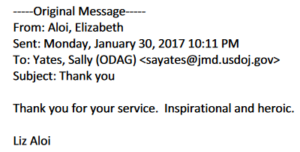
Yates, of course was fired. Yates will likely find herself featured in one or more of the forthcoming Inspector General’s Reports.
Note that Grassley provides justification for exposure of redaction 1 – but provides no justification for exposure of redaction 2.
He. just. did. it.
Grassley – as far as I can tell – decided to reveal what was seen in the “less-redacted” setting provided for Committee staff. The first example of the $70K coffee table is so indefensible he appears to be challenging DOJ to do anything about the second redaction.
Footnote 3 references other specific documents that have piqued Grassley’s interest. They can be found in the documents produced by Senator Ron Johnson which I’ve highlighted before. Here’s the pdf:
Appendix C – Documents (Incld FBI Text Messages) – 502 pages
As you can see, it’s quite long. But Grassley’s footnotes provide a roadmap. Using the reference numbers begin on page 227 of the pdf.
Grassley’s highlighted texts include most of the famous sequences – along with a few lesser examined conversations.
I’m not going to try and reinvent the wheel. There’s plenty of folks who’ve already spent significant amounts of time analyzing these.
I have posted the relevant portions as noted by Grassley.
Consider these both a roadmap and concurrent area of Grassley’s focus.
Inbox = Strzok (Peter)
Outbox = Page (Lisa)
DOJ-PROD-0000109
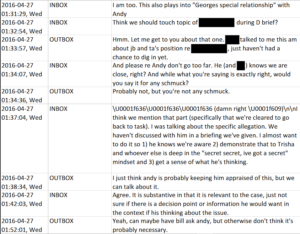
DOJ-PROD-0000119
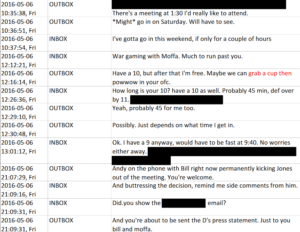
DOJ-PROD-0000123
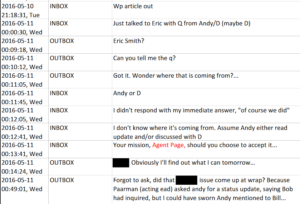
DOJ-PROD-0000154
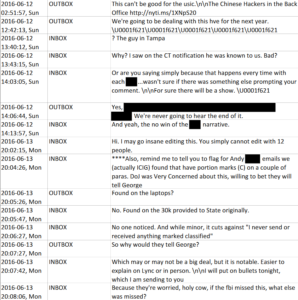
DOJ-PROD-0000199
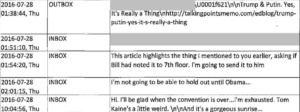
DOJ-PROD-0000202
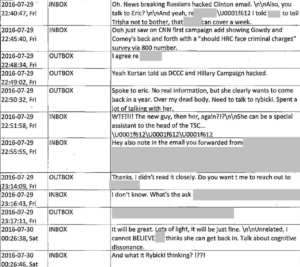
DOJ-PROD-0000204
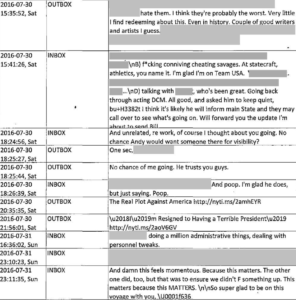
DOJ-PROD-0000206
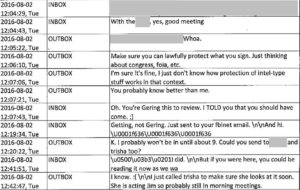
DOJ-PROD-0000208
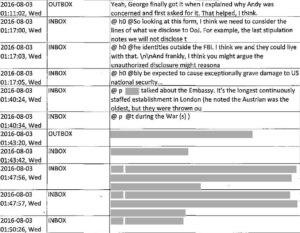
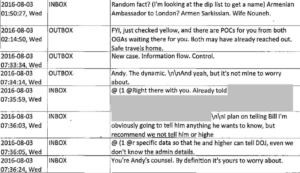
DOJ-PROD-0000210
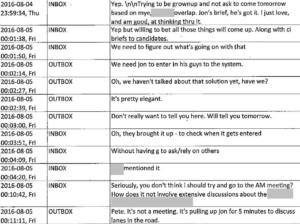
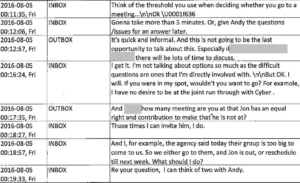
DOJ-PROD-0000212
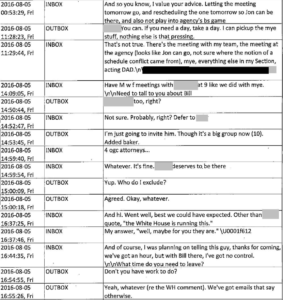
DOJ-PROD-0000219
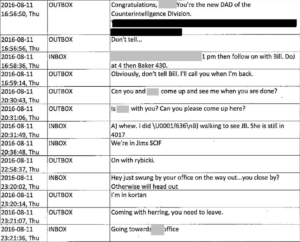
DOJ-PROD-0000220
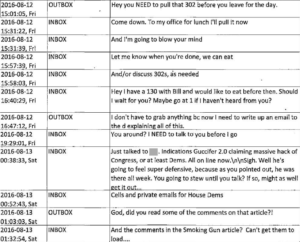
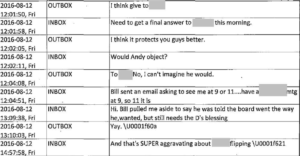
DOJ-PROD-0000222
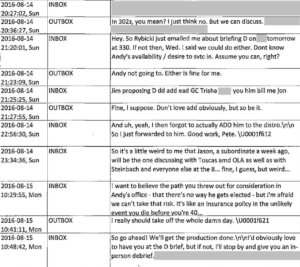
DOJ-PROD-0000226
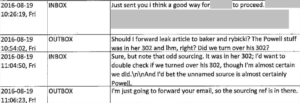
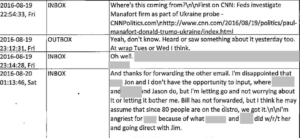
DOJ-PROD-0000233
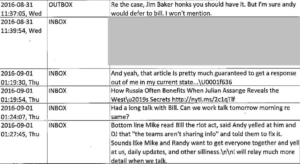
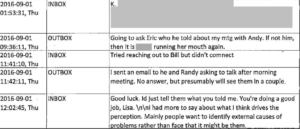
DOJ-PROD-0000258
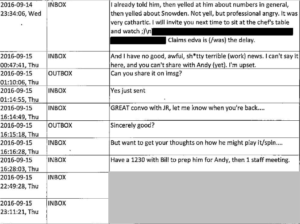
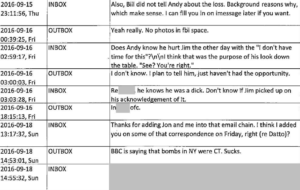
DOJ-PROD-0000274
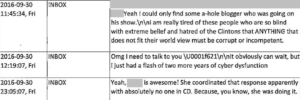
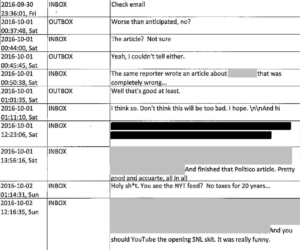
DOJ-PROD-0000275
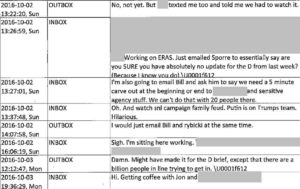
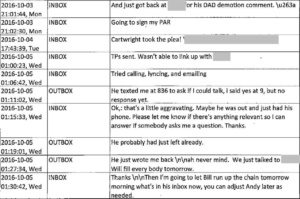
DOJ-PROD-0000276
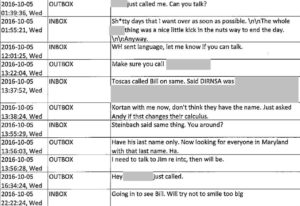
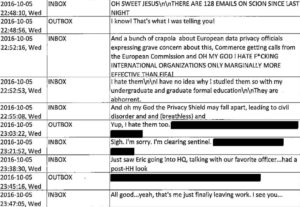
DOJ-PROD-0000324
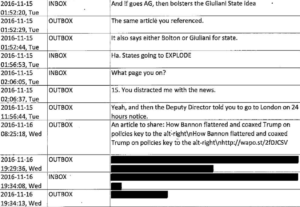
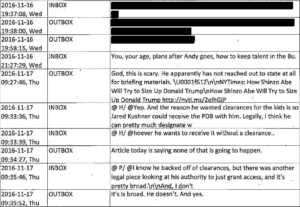
There was a lot more in Grassley’s letter than initially meets the eye.
Happy hunting to the internet sleuths.
newer post Devin Nunes – A Look of Shock
older post Did John Brennan Leak to Keep the FBI Counterintelligence Investigation Alive?